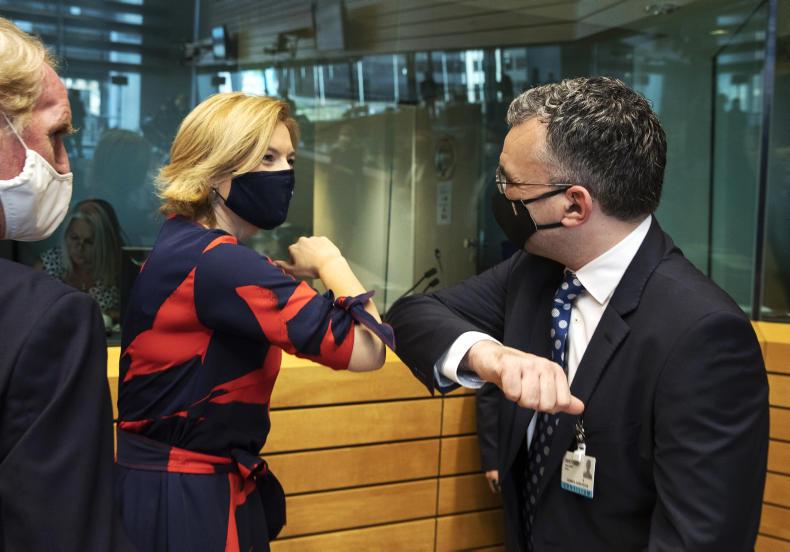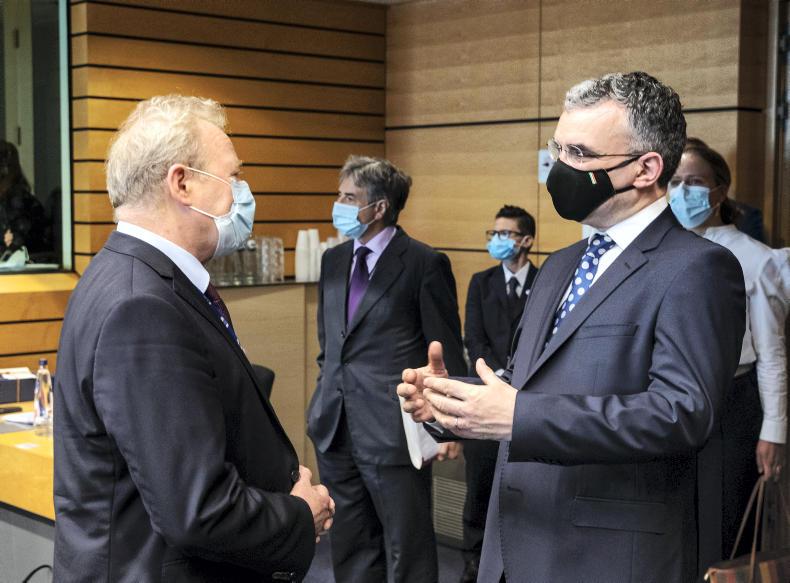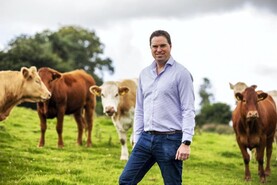The EU’s Farm to Fork strategy must be a guide to a sustainable future for farmers rather than “a straitjacket” of binding targets, new Minister for Agriculture Dara Calleary has said.
Speaking to his European counterparts for the first time at a meeting in Brussels, Minister Calleary said the strategy would be a challenge, but, if carefully managed and properly supported, it had the potential to be a major opportunity.
He said all initiatives in the strategy, which include a reduction in the use of fertilisers and pesticides, an increase in organic farming, and the designation of more land, must be based on impact assessments. There must also be sufficient support for farmers to implement any changes, Calleary said.
Impact assessments
European Commissioner for Health and Food Safety, Stella Kyriakides, who has primary responsibility for the strategy, reaffirmed commitments to carry out an impact assessment if any of the targets become legally binding.
The first target in the process is the halving of chemical pesticide use by 2050. The Commission has begun a review of the sustainable use of pesticides directive and a public consultation is now open.
Commissioner Kyriakides stressed that the targets would be at EU level and not for individual countries.
For example, one of the strategy's aims is to have the area under organic production reach 25% of all agricultural land by 2030. While the overall EU average stands 8% the range varies from countries such as Austria which has reached the 25% target to others, including Ireland, who currently stand at around 2%.

Minister for Agriculture Dara Calleary greets German Agriculture Minister Julia Klockner who holds the presidency of the Agriculture Council until December. \ European Union
Food prices
Minister Calleary raised concerns around how farmers will be compensated for their efforts to meet the strategy’s objectives.
“There is an underlying assumption within the strategy that consumers in the market will reward the primary producer with higher prices to offset increased costs for different types of food,” he said.
“The reality as we know is far from certain. Price remains the primary driver for most consumers. I think this issue alone illustrates the ongoing challenge we will have in seeking a balanced approach as we work our way through the implementation of the strategy.”
Commissioner Kyriakides responded by saying she believes the Farm to Fork strategy is an economic opportunity for farmers rather than a threat to their income. She said the CAP could help offset the costs for farmers and reward those who move to more sustainable production methods.
Read more
Organic growth will be subsidy- not market-led
What the Department plans to target in the next CAP
The EU’s Farm to Fork strategy must be a guide to a sustainable future for farmers rather than “a straitjacket” of binding targets, new Minister for Agriculture Dara Calleary has said.
Speaking to his European counterparts for the first time at a meeting in Brussels, Minister Calleary said the strategy would be a challenge, but, if carefully managed and properly supported, it had the potential to be a major opportunity.
He said all initiatives in the strategy, which include a reduction in the use of fertilisers and pesticides, an increase in organic farming, and the designation of more land, must be based on impact assessments. There must also be sufficient support for farmers to implement any changes, Calleary said.
Impact assessments
European Commissioner for Health and Food Safety, Stella Kyriakides, who has primary responsibility for the strategy, reaffirmed commitments to carry out an impact assessment if any of the targets become legally binding.
The first target in the process is the halving of chemical pesticide use by 2050. The Commission has begun a review of the sustainable use of pesticides directive and a public consultation is now open.
Commissioner Kyriakides stressed that the targets would be at EU level and not for individual countries.
For example, one of the strategy's aims is to have the area under organic production reach 25% of all agricultural land by 2030. While the overall EU average stands 8% the range varies from countries such as Austria which has reached the 25% target to others, including Ireland, who currently stand at around 2%.

Minister for Agriculture Dara Calleary greets German Agriculture Minister Julia Klockner who holds the presidency of the Agriculture Council until December. \ European Union
Food prices
Minister Calleary raised concerns around how farmers will be compensated for their efforts to meet the strategy’s objectives.
“There is an underlying assumption within the strategy that consumers in the market will reward the primary producer with higher prices to offset increased costs for different types of food,” he said.
“The reality as we know is far from certain. Price remains the primary driver for most consumers. I think this issue alone illustrates the ongoing challenge we will have in seeking a balanced approach as we work our way through the implementation of the strategy.”
Commissioner Kyriakides responded by saying she believes the Farm to Fork strategy is an economic opportunity for farmers rather than a threat to their income. She said the CAP could help offset the costs for farmers and reward those who move to more sustainable production methods.
Read more
Organic growth will be subsidy- not market-led
What the Department plans to target in the next CAP







 This is a subscriber-only article
This is a subscriber-only article










SHARING OPTIONS: